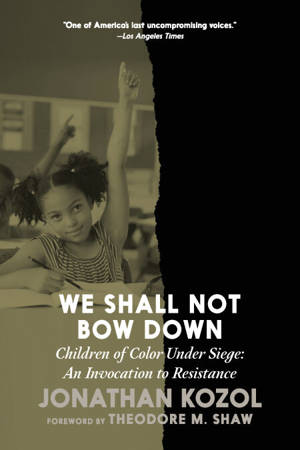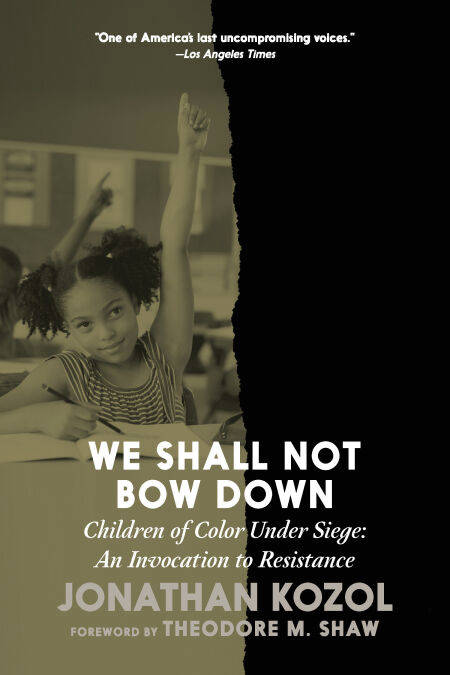
- Retrait gratuit dans votre magasin Club
- 7.000.000 titres dans notre catalogue
- Payer en toute sécurité
- Toujours un magasin près de chez vous
- Retrait gratuit dans votre magasin Club
- 7.000.0000 titres dans notre catalogue
- Payer en toute sécurité
- Toujours un magasin près de chez vous
We Shall Not Bow Down EBOOK
Children of Color Under Siege: An Invocation to Resistance
Jonathan Kozol
Ebook | Anglais
11,82 €
+ 11 points
Format
Description
An eloquent and passionate call for educational transformation—now in an updated paperback edition.
“An unapologetic cri de coeur about the shortcomings of the schools that serve poor Black and Hispanic children, and thus, the moral failure of the nation to end the inequality [Kozol] has documented for decades.”—New York Times
In the culminating work of his career, groundbreaking educator Jonathan Kozol goes back into urban schools, where racial isolation is at the highest level since he became a teacher and is now compounded by a new regime of punitive instruction and coercive uniformity that is deemed to be appropriate for children who are said to be incapable of learning in more democratic ways, like children in more privileged communities. Kozol believes it’s well past time to batter down the walls between two separate worlds of education and to make good, at long last, on the “promissory note” that Dr. Martin Luther King Jr. described on the steps of the Lincoln Memorial in 1963.
Cognitive Genocide takes aim directly at the disparate agenda that denies Black and Latino children the right to ask discerning questions about a system that places them in toxic sequestration and substitutes draconian penalties and a constant fear of failure for anything resembling healthy motivation. This extreme degree of indoctrinational and authoritarian instruction, Kozol writes, has robbed too many of our children of the power to think independently at a time when it is desperately needed in the face of an administration that is threatening the very essences of democracy.
The book concludes with a warm portrayal of a stunningly successful integration program in the metro Boston suburbs which Kozol believes ought to be a healing model for other districts in the nation. At this moment of political retrenchment, with Trump and Musk riding high, it may seem an impossible dream, but Kozol argues convincingly that it’s a goal worth fighting for.
“An unapologetic cri de coeur about the shortcomings of the schools that serve poor Black and Hispanic children, and thus, the moral failure of the nation to end the inequality [Kozol] has documented for decades.”—New York Times
In the culminating work of his career, groundbreaking educator Jonathan Kozol goes back into urban schools, where racial isolation is at the highest level since he became a teacher and is now compounded by a new regime of punitive instruction and coercive uniformity that is deemed to be appropriate for children who are said to be incapable of learning in more democratic ways, like children in more privileged communities. Kozol believes it’s well past time to batter down the walls between two separate worlds of education and to make good, at long last, on the “promissory note” that Dr. Martin Luther King Jr. described on the steps of the Lincoln Memorial in 1963.
Cognitive Genocide takes aim directly at the disparate agenda that denies Black and Latino children the right to ask discerning questions about a system that places them in toxic sequestration and substitutes draconian penalties and a constant fear of failure for anything resembling healthy motivation. This extreme degree of indoctrinational and authoritarian instruction, Kozol writes, has robbed too many of our children of the power to think independently at a time when it is desperately needed in the face of an administration that is threatening the very essences of democracy.
The book concludes with a warm portrayal of a stunningly successful integration program in the metro Boston suburbs which Kozol believes ought to be a healing model for other districts in the nation. At this moment of political retrenchment, with Trump and Musk riding high, it may seem an impossible dream, but Kozol argues convincingly that it’s a goal worth fighting for.
Spécifications
Parties prenantes
- Auteur(s) :
- Editeur:
Contenu
- Nombre de pages :
- 176
- Langue:
- Anglais
Caractéristiques
- EAN:
- 9781644215319
- Date de parution :
- 09-02-26
- Format:
- Ebook
- Protection digitale:
- Adobe DRM
- Format numérique:
- ePub

Les avis
Nous publions uniquement les avis qui respectent les conditions requises. Consultez nos conditions pour les avis.






